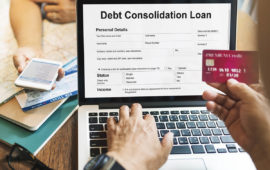Credello’s picks for you
Is Debt Consolidation a Good Idea?
There are many ways to consolidate your debt, but are they right for you? Learn the pros and cons of balance transfer cards, debt consolidation loans, and more. Read More
Common questions about debt consolidation
Debt consolidation is when you combine multiple debts into a single lower-interest payment. You may consolidate debt to simplify your monthly bills, lower your monthly payments to create more disposable income, or pay off your debt faster.
Learn more: What is Debt Consolidation
To consolidate debt with a personal loan, make sure your credit score is as high as possible. The better your credit, the higher your chances of approval. If you have a bad credit score, check your report for errors and catch up on any late or unpaid payments. Next, use a debt consolidation calculator to see if consolidating makes sense for you. If it does, be sure to compare loan options from banks, credit unions, and online lenders. Finally, get your proof of ID, address, and income ready and apply for that loan.
Some popular ways to consolidate debt are personal loans for debt consolidation, balance transfer credit cards, and debt management plans. All accomplish the goal of simplifying your debts into one monthly payment, albeit in different ways.
Other debt consolidation options include home equity loans and 401(k) loans.
Unsecured loans are more common though they typically come with higher interest rates than secured loans. Since secured loans are backed by collateral—like your home or savings account—you’re able to get a lower interest rate. But, as is the case with home equity loans, then you’re putting your house at risk.
Simply put, if you make your payments on time and don’t pick up any additional debt, consolidating shouldn’t hurt your score at all. Your credit score may take a temporary dip when you first apply for a loan, but if you use a debt consolidation loan to pay off debt, your credit will probably improve in the long run.
As with any loan, you’ll want to shop around for the best terms and interest rates available. If you have poor credit, be sure to check your credit report and rid it of errors before you start applying for loans. You can also boost your credit score by improving your debt-to-income ratio. Are there any small debts you can pay off without the loan?
If your prospective lender allows it, you can also get a cosigner to help you qualify for a lower rate on a loan. Your cosigner should have a high credit score and be prepared to take on responsibility for the loan should you default.
Debt consolidation is great if you have a payoff plan and budget in place to avoid additional debt. Consolidating can help you simplify your monthly payments, lower your total interest payments, or make your monthly budget more flexible.
So the short answer is yes, debt consolidation does really work—if you’re prepared, motivated, and disciplined enough.
Looking for the next step?
Let’s do it. We can match you with consolidation options based on your goals and debt info.
Compare debt routes
Browse all articles
We found 13 results














